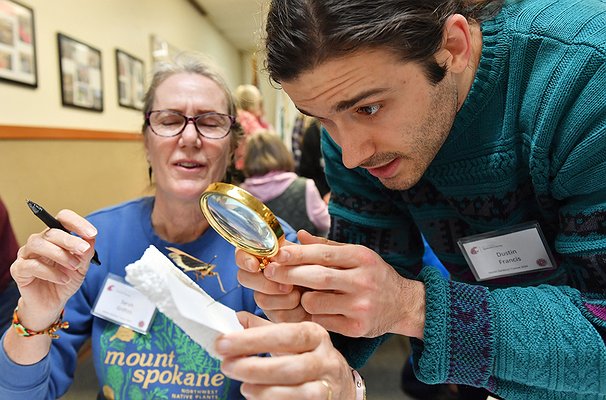WSU Extension tackles climate awareness
Groups of gardening enthusiasts were huddled around lab tables examining preserved insect specimens, learning the tell-tale signs of invasive pests that a warming climate could bring to the Pacific Northwest.
It was a cloudy afternoon at Washington State University’s Extension offices in Spokane County and with spring just around the corner the nearly 50 participants were taking careful notes. Similar educational exercises on a range of topics are conducted at Extension sites across Washington as part of a broader effort to promote climate change mitigation and adaption. This piece of that effort aims to improve early detection of invasive pests and diseases that can damage not just yards and gardens but entire crops and ecosystems.
“We’re training participants in our Master Gardeners program to be early detectors,” said Tim Kohlhauff, an urban horticulturalist with Extension in Spokane, who worked his way from table to table helping instructors answer questions. “Our volunteers tend to spend a lot of time in their yards and gardens, and by sharing what we know about the early warning signs, they’re helping expand the layers of protection for our state and region.”
The program shows promise.
Of the roughly 70 invasive pests detected in Washington since 1990, a study found more than a third of the first reports were from private individuals rather than government agencies and regulators. Many of those were master gardeners, said Todd Murray, an Extension entomologist and director of WSU’s Puyallup Research Center, who spearheaded the study.
That kind of early detection is key to containing potentially devastating infestations, said Murray, who also serves on the state’s Invasive Species Council. “One of the reasons I wanted to work at WSU is because of the Master Gardeners program,” he said. “It’s a great volunteer model that brings so much value to our state.”
It’s also just one example of how WSU Extension is moving greater climate awareness into its award-winning programming.
“Extension is about helping build resilient communities,” said WSU Extension Director Vicki McCracken. “We’ve been doing that as a partner in the growth of this state for more than a century through direct community outreach and as the needs of our communities change and evolve so can our programming.”
Indeed, adaption and mitigation have always been key to Extension’s mission, whether it’s helping farmers identify the best varieties for current local conditions or taking applied science directly to the families and others who can use it to address pressing needs.
“WSU has so much expertise that could benefit how the Pacific Northwest positions itself to deal constructively with these challenges,” said Brad Gaolach, director of the university’s Metropolitan Center for Applied Research and Extension. “We are working to make sure it’s being shared with those who can use it.”
Clark County Extension, for example, is working with community partners to pioneer an effort to reduce food waste. The multifaceted project includes helping families improve meal planning and learn how to best preserve food as well as supporting local farmers and increasing healthy food access for communities.
“There are things we can do right now that can begin to help us mitigate and adapt to these impacts,” said Kristine Perry, interim director of Extension operations in Clark County.
In Snohomish County, efforts are underway to build Extension’s volunteer base through projects such as its Sustainable Community Stewards program, which serves both English- and Spanish-speaking participants. The volunteers receive sustainability training and help promote recycling and food waste reduction. They also participate in a repair cafe where broken items can be fixed and reused instead of thrown out.
“This is about finding ways to bring climate to the forefront of our work,” said Anthony Gromko, director of Extension operations in Snohomish County.
For many, this kind of outreach can be a first exposure to the resources WSU has available to communities.
“We’ve been doing research-based sustainable education since 1973,” said Jennifer Marquis, the Master Gardeners statewide program director. “The newer parts about what we’re doing now is making sure we’re sharing what we know about climate change, training our volunteers to talk about that and getting this information into the hands of people who can use it.”





